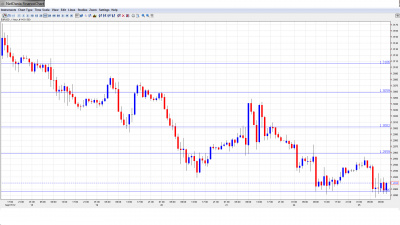EUR/USD was marked by choppy trading after a second straight day of weak German data, as the GfK German Consumer Climate fell below the market estimate. In Spain, the uncertainty continues as to whether the country will seek a bailout from the ECB to prop up its troubled economy.
Here’s an update about technical lines, fundamental indicators and sentiment regarding EUR/USD.
EUR/USD Technical
- Asian session: Euro/dollar moved upwards, consolidating at 1.2940. The pair has retraced in the European session, and is struggling to remain above 1.29.
- Current range: 1.29 – 1.2960
Further levels in both directions:
- Below: 1.29, 1.2814, 1.2750, 1.2670, 1.2624, 1.2587, 1.2520 and 1.2460.
- Above: 1.2960, 1.30, 1.3060, 1.3105, 1.32, 1.3290, 1.34, 1.3437, 1.3480 and 1.3540.
- 1.2960 continues to provide resistance.
- 1.29 is being tested as a support level. 1.2814 is stronger.
Euro/Dollar choppy after weak German data, Spanish uncertainty – click on the graph to enlarge.
EUR/USD Fundamentals
-
6:00 GfK German Consumer Climate. Exp. 6.0 points. Actual 5.9 points.
- 13:00 ECB President Mario Draghi speaks.
- 13:00 S&P/CS Composite-20 HPI. Exp. +1.3%.
- 14:00 US CB Consumer Confidence. Exp. 63.1 points. See how to trade this event with USD/JPY.
- 14:00 US HPI. Exp. 0.4%.
- 14:00 Richmond Manufacturing Index. Exp. -6 points.
- 17:30 Treasury Secretary Timothy Geithner Speaks.
EUR/USD Sentiment
- Spanish woes spooking markets: Spain continues to be beset by severe economic troubles, which is only exacerbating market uncertainty. A bailout package for Spain is not a given, just yet, after the Spanish economy minister said the country would not rush to seek aid from the ECB. The government may feel it has some breathing room after the recent 10-year Spanish Bond Auction – that was very successful. Some analysts have suggested that PM Mariano Rajoy would prefer to push the official request until after October 21, due to internal calculations. This week promises to keep the markets busy. On Thursday, as the government is expected to announce a draft budget and far-reaching economic reforms. The results of the stress tests on banks will be announced on Friday. As well, Moody’s is expected to complete their ratings review on Spain later this week.
- Greece talks with troika continue: With the troika showing some flexibility over Greek repayments, there is hope for a quick conclusion of new measures, which will later require the approval of coalition partners. Talks about a third bailout program became more loud in recent days, as Greece is nowhere close to meeting targets. Media reports in Germany noted that Greece could be in the red for as much as 20 billion euros, almost twice the previous estimate. Although the reports were denied by the Greek Finance Ministry, such talk will do little to calm nervous investors.
- European recession looms: France saw a big plunge in its purchasing managers’ indices, and the Euro-zone releases remain unimpressive. All in all, the euro-zone is contracting at a very fast pace, and this is worrying. Germany, once the all-powerful locomotive in Europe, is also producing worrying numbers, as its economy looks more and more vulnerable to the malady gripping much of Europe. No less important, consumer and business confidence is weak. The markets received a rude reminder of that this week, as German Business Climate and Consumer Climate releases fell below market estimates.
- Geopolitical tensions escalate: In China, protests against Japan over some disputed islands have forced the closure of Japanese factories and businesses. Japan has responded by halting all commercial flights to China. Souring relations between the world’s second and third largest economies is the last thing the sluggish global economy needs right now. Tensions could rise in the UN General Assembly, with the continuing bloodshed in Syria and escalating war of words between Israel and Iran. The US is scrambling to defuse the rising tensions, a task made all the trickier with the November US elections looming.
- Dollar rebounds after QE3 : After weeks of speculation, the Fed finally gave the nod to QE3 earlier this month. It launched an open ended program worth $40 billion dollars of monthly buys of MBS in order to help the housing sector, but also to encourage lending. This comes in addition to extending the low rates guidance to 2015 and continuing the existing Twist program worth $45 billion a month. This aggressive easing was later justified by Bernanke, who also said that the Fed is looking at the general picture of unemployment (including the participation rate). The dollar did take a beating right after the QE announcement, but is has since rebounded. There is growing notion that a) the move was priced in, and b) the worsening global outlook will aid the greenback.
- US economy – up, down, or both?: The housing sector has gained steam recently, and Existing Home Sales looked sharp, posting a figure of 4.82 million. However, jobless claims remain at stubbornly high levels, and the improvement in the Philly Fed Index still left it in the red. As the November elections fast approach, both Democrats and Republicans will be highlighting whichever economic releases help their campaign. Given the mixed batch of releases, both camps should have plenty of data to choose from.

